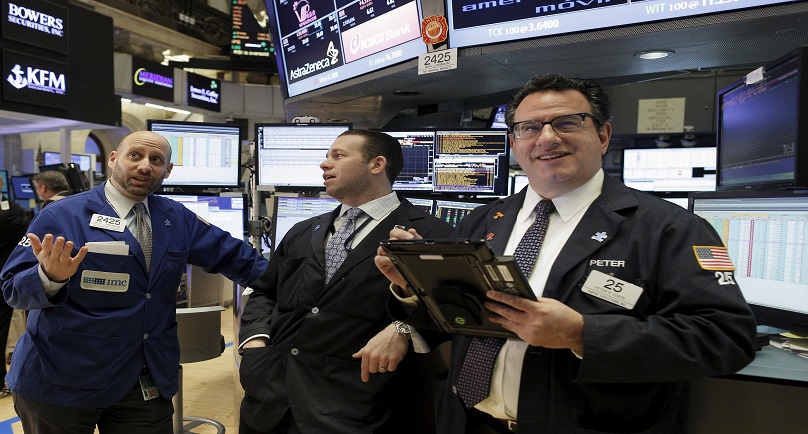Image: Traders work on the floor of the New York Stock Exchange January 21, 2016. REUTERS/Brendan McDermid
By Noel Randewich
(Reuters) – Wall Street surged over 2 percent on Friday after the Bank of Japan unexpectedly cut interest rates and Microsoft led a major rally in technology shares, repairing some of the damage to the S&P 500’s worst January since 2009.
Slammed by collapsing oil prices that have fed doubts about the health of the global economy, stocks have had a volatile start to the year. At one point last week, the S&P’s loss for 2016 reached 11 percent before recovering to end the month down 5 percent.
The index rose 2.48 percent on Friday, its strongest day since September.
“Sentiment certainly had swung to a wildly negative scenario. In the short term, I’m not sure the sentiment backdrop we’ve seen was warranted,” said Michael Church, president of Addison Capital Management in Philadelphia.
“What happens if there is not a recession? What happens if China stabilizes and the Fed doesn’t raise rates aggressively?”
Global equities got a surprise boost on Friday after Japan’s central bank cut a benchmark rate below zero to stimulate its economy.
Stocks were also lifted by weak fourth-quarter U.S. gross domestic product growth data, which bolstered arguments that the Federal Reserve might go slower than expected on future rate hikes.
While the Fed has not ruled out a rate hike in March, many investors believe recent global economic and financial turmoil may lead it to wait.
Microsoft shares jumped 5.83 percent on better-than-expected results.
The software company was the biggest influence on the S&P 500 and the Nasdaq and helped push the S&P tech sector up 3.6 percent, its strongest session since August.
Fourth-quarter corporate reporting season is well under way, with S&P 500 companies on average expected to post a 4.1 percent drop in earnings, according to Thomson Reuters I/B/E/S. Excluding energy companies, earnings are seen rising 2.1 percent.
The Dow Jones industrial average ended 2.47 percent higher at 16,466.30 while the S&P 500 gained 46.88 points or 2.48 percent higher to end at 1,940.24.
The Nasdaq Composite surged 2.38 percent to 4,613.95.
For the week, the Dow gained 2.3 percent, the S&P added 1.7 percent and the Nasdaq increased 0.5 percent.
That left the Dow down 5.5 percent for the month and the Nasdaq 7.9 percent lower, its largest monthly loss since May 2010.
In Friday’s trading, Amazon slumped 7.61 percent after its quarterly profit missed expectations.
Xerox gained 5.63 percent after announcing a deal with Carl Icahn to split itself into two.
U.S. crude oil rose 1.4 percent after trimming early gains on a report that Iran would not participate in a possible deal between OPEC and other producing countries to reduce output.
Advancing issues outnumbered decliners on the NYSE by 2,789 to 339. On the Nasdaq, 2,290 issues rose and 584 fell.
The S&P 500 index showed 16 new 52-week highs and seven new lows, while the Nasdaq recorded 28 new highs and 100 new lows.
About 10.0 billion shares changed hands on U.S. exchanges, above the 8.3 billion daily average for the past 20 trading days, according to Thomson Reuters data.
(Additional reporting by Abhiram Nandakumar in Bengaluru; Editing by Nick Zieminski and James Dalgleish)
Copyright 2015 Thomson Reuters. Click for Restrictions.


